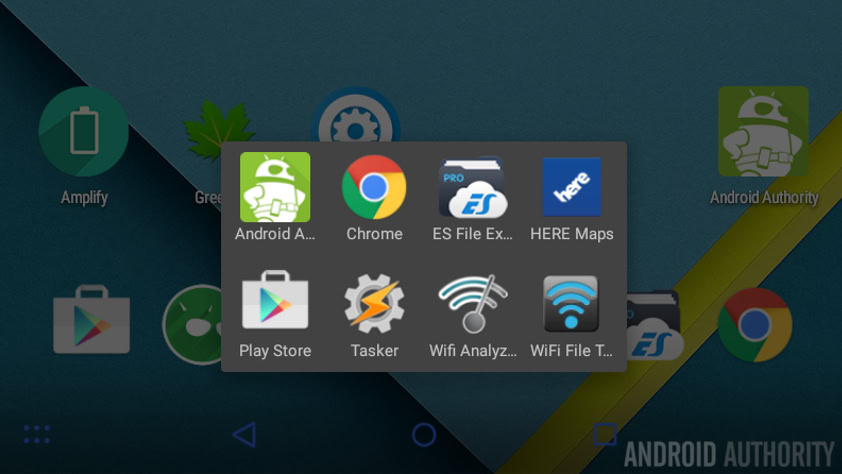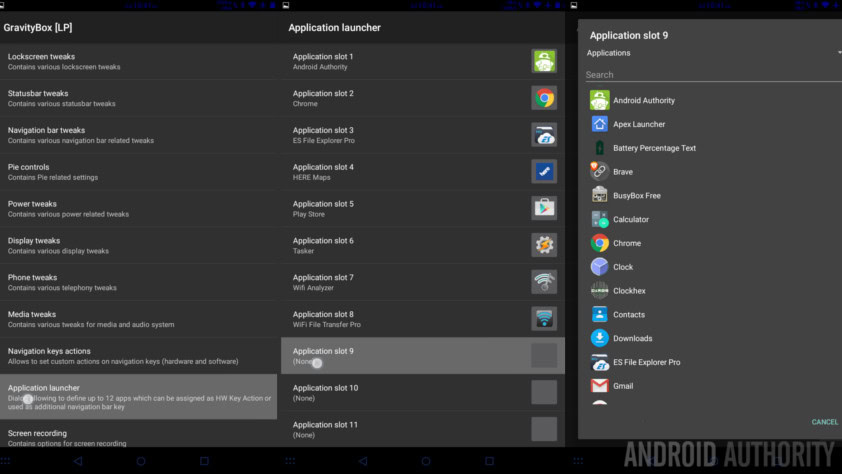Affiliate links on Android Authority may earn us a commission. Learn more.
Mini app drawer on your navigation bar, root required - Android customization
Picking up from where we left off with GravityBox on our Android customization series last week, let’s take it low. That is, we would like to use this Xposed module to make some tweaks to our navigation bar.
From swapping button locations and colors to adding a new app drawer, GravityBox has a few cool tricks up its sleeve, let’s check it out.
Before we begin
The rules for GravityBox have not changed, you are going to need a fairly modern Android device, you’ll need to root it and flash a custom recovery. From there, flash the Xposed Framework, install the latest Xposed Installer and find your appropriate version of GravityBox.
Sounds like a lot, no worries, we walked through this already:
Rooting your Android device, a few things to think about
Xposed modules and Xposed installer basics
Install GravityBox and some basics
Should you root your device?
Mini app drawer on your navigation bar with GravityBox

For those of you looking for the quick version of this tutorial, be sure to simply dive into GravityBox and open the Navigation bar tweaks section. Most items are fairly self explanatory, giving you access to change layout, colors, size and add or remove extra buttons and functions.
Aside from the ability to outright turn off the navigation bar, you can also try relocating it, for that added customization.
Let’s get to the point of today, adding a mini app drawer to your navigation bar. I have to say, this is extremely convenient, with everything set up, sitting just to the left of your normal Back button will be a few extra dots, tap them to quickly access up to 12 of your favorite apps without ever having to leave the app you are currently using.
Yes, we did do something like this last week, but not all of you care for the swipe from the edge Pie control.
First things first, let’s set up which apps you want on your mini app drawer.

Open GravityBox.
Go to Application Launcher.
Tap on each of the Application slots that you wish to fill. Remember that this is the same GravityBox tool as we’ve seen previous, so you can put system Settings shortcuts and more, not just app links.
When complete, head back to the main list of GravityBox and choose Navigation bar tweaks.

A fair way down is the option for Custom key settings, tap on it.
You’ll need to enable it, simple enough.
That is actually all there is to it. As a basic and default setup you are good to go. However, you can see the extra tools there, including the ability to relocate the launcher icon to the right hand side, change it to a simpler icon and add long-press and double tap functions.
You know me, I used the long-press option to take screenshots.
What’s next

I am sure you noticed that Navigation bar tweaks in GravityBox include more than a few options to change looks and functions of your navigation bar. Please take some time to play around, it solves nothing more than to make you happy with your device, but that is totally worth it.
Special note, GravityBox has an option called the Navigation bar ring. They are talking about the Google Now quick access, you know, long-press and/or swipe up from the Home button. You can disable this action or outright change what app/setting fires off when you perform the typical Google now action. Much faster and cleaner than our previous approach. Enjoy!
Finally, take special note of the options that require you to restart your device before they are activated. There are two ways of thinking of this, the first is to consolidate the options so that you can get them all enabled with one restart, the other idea is to do them one at a time, just in case they break your setup. I went for it all at the same time, without issue.
Next week
We are not quite finished with GravityBox on our Android customization series just yet. I hope these little feature highlights have been helpful to you, we’ve got at least two more coming.
What do you say, is it worth playing around with your navigation bar, or do you prefer the stock experience on your device?
More GravityBox features and some root apps: